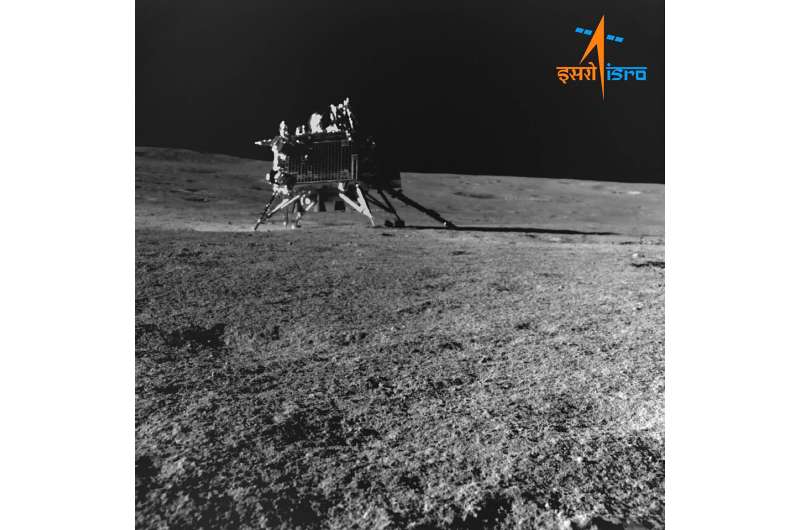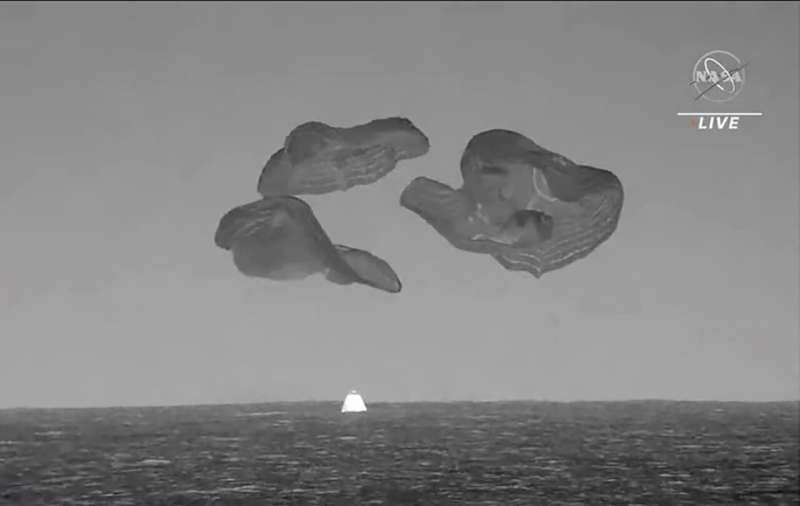
Copernical Team
Monday, 04 September 2023 10:35
SpaceX sends 22 new Starlink satellites into orbit in 60th launch of 2023
Miami FL (UPI) Aug 31, 2023
 Twenty-two new Starlink Internet satellites started orbiting the Earth after a successful launch by SpaceX late Thursday night from Cape Canaveral Space Force Station.
The satellites, part of the constellation being created by SpaceX to provide Internet access even in the most remote locations on the globe, were taken into space by the workhorse Falcon 9 rocket at 10:21 p.m. EDT.
In
Twenty-two new Starlink Internet satellites started orbiting the Earth after a successful launch by SpaceX late Thursday night from Cape Canaveral Space Force Station.
The satellites, part of the constellation being created by SpaceX to provide Internet access even in the most remote locations on the globe, were taken into space by the workhorse Falcon 9 rocket at 10:21 p.m. EDT.
In
 Twenty-two new Starlink Internet satellites started orbiting the Earth after a successful launch by SpaceX late Thursday night from Cape Canaveral Space Force Station.
The satellites, part of the constellation being created by SpaceX to provide Internet access even in the most remote locations on the globe, were taken into space by the workhorse Falcon 9 rocket at 10:21 p.m. EDT.
In
Twenty-two new Starlink Internet satellites started orbiting the Earth after a successful launch by SpaceX late Thursday night from Cape Canaveral Space Force Station.
The satellites, part of the constellation being created by SpaceX to provide Internet access even in the most remote locations on the globe, were taken into space by the workhorse Falcon 9 rocket at 10:21 p.m. EDT.
In
Published in
News
Tagged under
Sunday, 03 September 2023 08:16
India's moon rover completes its walk. Scientists analyzing data looking for signs of frozen water

Published in
News
Tagged under
Monday, 04 September 2023 06:50
Four astronauts return to Earth in SpaceX capsule to wrap up six-month station mission

Published in
News
Tagged under
Sunday, 03 September 2023 08:16
India's moon rover completes its walk, scientists analyzing data looking for signs of frozen water.

Published in
News
Tagged under
Sunday, 03 September 2023 10:50
Unprecedented gamma-ray burst explained by long-lived jet
Evanston IL (SPX) Sep 04, 2023
 Last year, Northwestern University researchers reported new observational evidence that long gamma-ray bursts (GRBs) can result from the merger of a neutron star with another compact object (either another neutron star or black hole) - a finding that was previously believed to be impossible.
Now, another Northwestern team offers a potential explanation for what generated the unprecedented
Last year, Northwestern University researchers reported new observational evidence that long gamma-ray bursts (GRBs) can result from the merger of a neutron star with another compact object (either another neutron star or black hole) - a finding that was previously believed to be impossible.
Now, another Northwestern team offers a potential explanation for what generated the unprecedented
 Last year, Northwestern University researchers reported new observational evidence that long gamma-ray bursts (GRBs) can result from the merger of a neutron star with another compact object (either another neutron star or black hole) - a finding that was previously believed to be impossible.
Now, another Northwestern team offers a potential explanation for what generated the unprecedented
Last year, Northwestern University researchers reported new observational evidence that long gamma-ray bursts (GRBs) can result from the merger of a neutron star with another compact object (either another neutron star or black hole) - a finding that was previously believed to be impossible.
Now, another Northwestern team offers a potential explanation for what generated the unprecedented
Published in
News
Tagged under
Sunday, 03 September 2023 10:50
How is ESA supporting ISRO's Aditya-L1 solar mission
Paris, France (ESA) Sep 04, 2023
 The Indian Space Research Organisation (ISRO) has launched its Aditya-L1 solar observatory from Satish Dhawan Space Centre in Sriharikota Range (SDSC SHAR), India, at 11:50 IST (08:20 CEST) on 2 September 2023.
It's an ambitious mission that will generate vast quantities of science data as the spacecraft balances in an unstable orbit. With its global network of deep space ground stations a
The Indian Space Research Organisation (ISRO) has launched its Aditya-L1 solar observatory from Satish Dhawan Space Centre in Sriharikota Range (SDSC SHAR), India, at 11:50 IST (08:20 CEST) on 2 September 2023.
It's an ambitious mission that will generate vast quantities of science data as the spacecraft balances in an unstable orbit. With its global network of deep space ground stations a
 The Indian Space Research Organisation (ISRO) has launched its Aditya-L1 solar observatory from Satish Dhawan Space Centre in Sriharikota Range (SDSC SHAR), India, at 11:50 IST (08:20 CEST) on 2 September 2023.
It's an ambitious mission that will generate vast quantities of science data as the spacecraft balances in an unstable orbit. With its global network of deep space ground stations a
The Indian Space Research Organisation (ISRO) has launched its Aditya-L1 solar observatory from Satish Dhawan Space Centre in Sriharikota Range (SDSC SHAR), India, at 11:50 IST (08:20 CEST) on 2 September 2023.
It's an ambitious mission that will generate vast quantities of science data as the spacecraft balances in an unstable orbit. With its global network of deep space ground stations a
Published in
News
Tagged under
Sunday, 03 September 2023 10:50
Hot Jupiter blows its top
Austin TX (SPX) Sep 04, 2023
 A planet about 950 light years from Earth could be the Looney Tunes' Yosemite Sam equivalent of planets, blowing its atmospheric 'top' in spectacular fashion.
The planet called HAT-P-32b is losing so much of its atmospheric helium that the trailing gas tails are among the largest structures yet known of an exoplanet, a planet outside our solar system, according to observations by astronome
A planet about 950 light years from Earth could be the Looney Tunes' Yosemite Sam equivalent of planets, blowing its atmospheric 'top' in spectacular fashion.
The planet called HAT-P-32b is losing so much of its atmospheric helium that the trailing gas tails are among the largest structures yet known of an exoplanet, a planet outside our solar system, according to observations by astronome
 A planet about 950 light years from Earth could be the Looney Tunes' Yosemite Sam equivalent of planets, blowing its atmospheric 'top' in spectacular fashion.
The planet called HAT-P-32b is losing so much of its atmospheric helium that the trailing gas tails are among the largest structures yet known of an exoplanet, a planet outside our solar system, according to observations by astronome
A planet about 950 light years from Earth could be the Looney Tunes' Yosemite Sam equivalent of planets, blowing its atmospheric 'top' in spectacular fashion.
The planet called HAT-P-32b is losing so much of its atmospheric helium that the trailing gas tails are among the largest structures yet known of an exoplanet, a planet outside our solar system, according to observations by astronome
Published in
News
Tagged under
Sunday, 03 September 2023 10:50
New giant planet evidence of possible planetary collisions
Bristol UK (SPX) Sep 04, 2023
 A Neptune-sized planet denser than steel has been discovered by an international team of astronomers, who believe its composition could be the result of a giant planetary clash.
TOI-1853b's mass is almost twice that of any other similar-sized planet known and its density is incredibly high, meaning that it is made up of a larger fraction of rock than would typically be expected at that sca
A Neptune-sized planet denser than steel has been discovered by an international team of astronomers, who believe its composition could be the result of a giant planetary clash.
TOI-1853b's mass is almost twice that of any other similar-sized planet known and its density is incredibly high, meaning that it is made up of a larger fraction of rock than would typically be expected at that sca
 A Neptune-sized planet denser than steel has been discovered by an international team of astronomers, who believe its composition could be the result of a giant planetary clash.
TOI-1853b's mass is almost twice that of any other similar-sized planet known and its density is incredibly high, meaning that it is made up of a larger fraction of rock than would typically be expected at that sca
A Neptune-sized planet denser than steel has been discovered by an international team of astronomers, who believe its composition could be the result of a giant planetary clash.
TOI-1853b's mass is almost twice that of any other similar-sized planet known and its density is incredibly high, meaning that it is made up of a larger fraction of rock than would typically be expected at that sca
Published in
News
Tagged under
Sunday, 03 September 2023 10:50
Scientists detect and validate the longest-period exoplanet found with TESS
Albuquerque NM (SPX) Sep 04, 2023
 Scientists from The University of New Mexico (UNM), and Massachusetts Institute of Technology (MIT) have detected and validated two of the longest-period exoplanets found by TESS to date. These long period large exoplanets orbit a K dwarf star and belong to a class of planets known as warm Jupiters, which have orbital periods of 10-200 days and are at least six times Earth's radius. This recent
Scientists from The University of New Mexico (UNM), and Massachusetts Institute of Technology (MIT) have detected and validated two of the longest-period exoplanets found by TESS to date. These long period large exoplanets orbit a K dwarf star and belong to a class of planets known as warm Jupiters, which have orbital periods of 10-200 days and are at least six times Earth's radius. This recent
 Scientists from The University of New Mexico (UNM), and Massachusetts Institute of Technology (MIT) have detected and validated two of the longest-period exoplanets found by TESS to date. These long period large exoplanets orbit a K dwarf star and belong to a class of planets known as warm Jupiters, which have orbital periods of 10-200 days and are at least six times Earth's radius. This recent
Scientists from The University of New Mexico (UNM), and Massachusetts Institute of Technology (MIT) have detected and validated two of the longest-period exoplanets found by TESS to date. These long period large exoplanets orbit a K dwarf star and belong to a class of planets known as warm Jupiters, which have orbital periods of 10-200 days and are at least six times Earth's radius. This recent
Published in
News
Tagged under
Sunday, 03 September 2023 10:50
How does "MAD" accretion form around a black hole?
Shanghai, China (SPX) Sep 04, 2023
 An international scientific team has revealed for the first time the magnetic field transport processes in the accretion flow of a black hole and the formation of a "MAD"-a magnetically arrested disk-in the vicinity of a black hole. The researchers made the discovery while conducting multi-wavelength observational studies of an outburst event of the black hole X-ray binary MAXI J1820+070, using
An international scientific team has revealed for the first time the magnetic field transport processes in the accretion flow of a black hole and the formation of a "MAD"-a magnetically arrested disk-in the vicinity of a black hole. The researchers made the discovery while conducting multi-wavelength observational studies of an outburst event of the black hole X-ray binary MAXI J1820+070, using
 An international scientific team has revealed for the first time the magnetic field transport processes in the accretion flow of a black hole and the formation of a "MAD"-a magnetically arrested disk-in the vicinity of a black hole. The researchers made the discovery while conducting multi-wavelength observational studies of an outburst event of the black hole X-ray binary MAXI J1820+070, using
An international scientific team has revealed for the first time the magnetic field transport processes in the accretion flow of a black hole and the formation of a "MAD"-a magnetically arrested disk-in the vicinity of a black hole. The researchers made the discovery while conducting multi-wavelength observational studies of an outburst event of the black hole X-ray binary MAXI J1820+070, using
Published in
News
Tagged under

